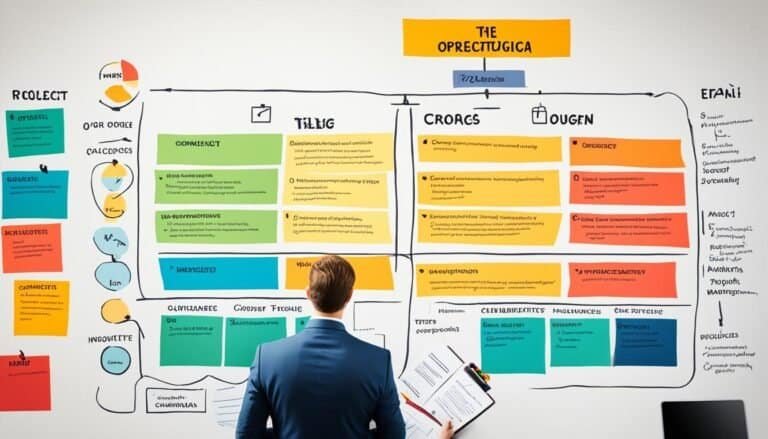Agile Coaching: Enhancing Performance in Agile Projects
Agile coaching has emerged as a critical component in enhancing the performance of agile projects. As organizations increasingly adopt agile methodologies, the role of an agile coach becomes pivotal in guiding and enabling teams to achieve their full potential.
With their expertise in agile principles and practices, agile coaches help teams navigate the complexities of agile projects, optimize their performance, and drive continuous improvement.
But what exactly does agile coaching entail? How does it benefit agile projects? And what are the key responsibilities and techniques employed by agile coaches?
In this discussion, we will explore these questions and delve into the world of agile coaching to understand how it can truly enhance the performance of agile projects.
Key Takeaways
- Agile coaching plays a crucial role in supporting teams and individuals in adopting and implementing Agile methodologies and principles.
- The responsibilities of an Agile coach include guiding teams through the complexities of Agile practices, facilitating effective communication and collaboration, and acting as a mediator to foster trust and openness.
- The benefits of Agile coaching include improving overall team effectiveness and productivity, enhancing collaboration and performance, enabling teams to adapt to changing project requirements, and promoting a culture of continuous improvement.
- Coaching techniques for agility involve building strong relationships, employing active listening and powerful questions, promoting collaboration and effective communication, and supporting continuous improvement through mentoring, workshops, and retrospectives.
The Role of Agile Coaching
The role of Agile coaching is crucial in enhancing performance and ensuring the success of Agile projects. Agile coaching involves supporting teams and individuals in adopting and implementing Agile methodologies and principles. Agile coaches play a pivotal role in guiding teams through the complexities of Agile practices, helping them navigate challenges and achieve their goals.
One of the primary responsibilities of an Agile coach is to facilitate effective communication and collaboration within the team. They act as a mediator, fostering an environment of trust and openness. By encouraging frequent and transparent communication, Agile coaches help teams identify and address issues early on, leading to improved performance and productivity.
Agile coaches also serve as mentors, providing guidance and support to team members. They help individuals understand and embrace Agile values and practices, ensuring a smooth transition to an Agile mindset. Through their coaching, Agile coaches empower teams to take ownership of their work, fostering a sense of accountability and self-organization.
Despite the benefits Agile coaching brings, it also presents its own set of challenges. One of the major challenges is resistance to change. Agile coaches must navigate resistance from team members who are unfamiliar with the Agile framework or hesitant to adopt new practices. It requires patience, empathy, and effective communication skills to address these challenges and facilitate a smooth transition.
Benefits of Agile Coaching
Agile coaching brings with it a range of benefits that can greatly enhance the performance of agile projects. By utilizing specific coaching techniques for agility, teams are able to improve their overall effectiveness and productivity.
This, in turn, leads to better team performance, increased collaboration, and the ability to adapt and respond to changing project requirements with ease.
Coaching Techniques for Agility
Coaching techniques for agility are instrumental in driving performance and success in agile projects. Adopting an agility mindset is crucial for individuals and teams to embrace change, adapt quickly, and deliver value continuously. Agile coaches play a pivotal role in facilitating this mindset shift by employing effective coaching techniques.
To enhance coaching effectiveness, agile coaches focus on building strong relationships with team members and stakeholders. They employ active listening, asking powerful questions, and providing constructive feedback to promote self-reflection and learning. Coaches also encourage collaboration and facilitate effective communication within the team, fostering a culture of trust and transparency.
Furthermore, agile coaches use various techniques such as mentoring, facilitating workshops, and conducting retrospectives to support continuous improvement. They help teams identify and address challenges, remove obstacles, and promote a culture of experimentation and innovation.
Impact on Team Performance
Enhancing team performance through agile coaching involves empowering individuals and fostering a culture of collaboration and continuous improvement. Agile coaching can have a significant impact on team performance by improving team collaboration and communication effectiveness. Here are three key benefits of agile coaching:
- Increased team collaboration: Agile coaching encourages team members to work together, share knowledge, and support each other. Through collaborative practices such as daily stand-up meetings, sprint planning sessions, and retrospectives, team members can align their efforts, coordinate tasks, and make collective decisions. This fosters a sense of unity and enhances overall team performance.
- Improved communication effectiveness: Agile coaching emphasizes clear and transparent communication. Coaches help teams adopt communication tools and techniques that facilitate effective information sharing, such as visual boards, regular progress updates, and open feedback channels. This enables team members to exchange ideas, resolve conflicts, and make informed decisions, leading to better outcomes.
- Enhanced problem-solving capabilities: Agile coaching encourages teams to continuously learn and improve. Coaches facilitate problem-solving sessions and guide teams in identifying and addressing obstacles and bottlenecks. By fostering a culture of experimentation and learning, agile coaching empowers teams to find innovative solutions and adapt to changing circumstances, ultimately enhancing team performance.
Key Responsibilities of Agile Coaches
In order for agile coaches to effectively enhance performance in agile projects, it is crucial for them to have role clarity and empower their teams.
Role clarity ensures that everyone understands the coach's responsibilities, allowing for smooth collaboration and coordination.
Role Clarity
Agile coaches play a crucial role in guiding teams towards achieving optimal performance and success in agile projects.
One of the key challenges they face is ensuring role clarity within the team. Role conflict can arise when team members have overlapping responsibilities or unclear expectations.
Agile coaches help mitigate this issue by clarifying the roles and responsibilities of each team member, ensuring that everyone understands their specific contributions and areas of focus. They also help identify and address communication barriers that may hinder effective collaboration.
Team Empowerment
A fundamental responsibility of agile coaches is to empower teams to reach their highest potential. Team empowerment is crucial for effective collaboration and self-organization within agile projects.
Agile coaches are tasked with creating an environment that fosters team collaboration, encouraging individuals to work together towards a common goal. By promoting open communication and active participation, coaches enable teams to make collective decisions, share knowledge, and leverage diverse perspectives.
Moreover, coaches facilitate self-organization by encouraging teams to take ownership of their work, make independent decisions, and continuously improve their processes. They provide guidance and support, ensuring that teams have the necessary skills and resources to overcome challenges and achieve their objectives.
Agile Coaching Techniques and Tools
Enhancing the performance of agile projects involves employing a range of adaptable and collaborative coaching techniques and tools. Agile coaching challenges can arise from various factors such as resistance to change, lack of understanding of agile principles, or team dynamics issues. To address these challenges, agile coaches utilize various methodologies to guide teams towards success.
Here are three effective agile coaching techniques and tools:
- Retrospectives: Regular retrospectives provide a platform for teams to reflect on their work and identify areas for improvement. Agile coaches facilitate these sessions, ensuring that all team members have an opportunity to voice their opinions and contribute to the retrospective. By encouraging open and honest discussions, coaches help teams identify bottlenecks, address conflicts, and implement actionable solutions.
- Visual Boards: Visual boards, such as Kanban or Scrum boards, are powerful tools that enable teams to visualize their work and track progress. Agile coaches help teams create and maintain these boards, ensuring that they reflect the current state of the project. By visualizing work items, team members can easily identify dependencies, prioritize tasks, and collaborate effectively.
- Coaching Circles: Coaching circles involve bringing together agile coaches and team members in a collaborative learning environment. These circles provide a platform for sharing experiences, discussing challenges, and seeking guidance. Agile coaches facilitate these sessions, fostering a culture of continuous learning and improvement.
Overcoming Challenges in Agile Projects With Coaching
To effectively navigate the challenges that arise in agile projects, agile coaches employ their adaptable coaching techniques and tools, ensuring teams overcome obstacles and achieve success. Agile coaching challenges can vary from project to project, but there are strategies that coaches can employ to help teams overcome these challenges.
One common challenge in agile projects is resistance to change. Agile coaches can address this by fostering a culture of open communication and collaboration. They encourage team members to voice their concerns and provide them with the support and guidance needed to embrace change. Coaches also work closely with stakeholders to help them understand the benefits of agile methodologies and the importance of adapting to change.
Another challenge is managing team dynamics. Agile coaches can use various techniques to promote effective teamwork, such as facilitating regular retrospectives where team members can reflect on their performance and identify areas for improvement. They also encourage self-organization within the team, empowering individuals to take ownership of their work and collaborate effectively.
Additionally, agile coaches face the challenge of ensuring the team remains focused and motivated throughout the project. They can address this by setting clear goals and objectives, providing regular feedback and recognition, and fostering a positive and inclusive team environment. Coaches also help teams identify and address any issues or roadblocks that may be affecting their performance.
Measuring the Impact of Agile Coaching
Measuring the impact of agile coaching requires a comprehensive evaluation of the team's performance and the overall project outcomes. It is essential to assess the effectiveness of coaching in order to understand its contribution towards achieving project goals and enhancing team performance. Here are three key factors to consider when measuring the impact of agile coaching:
- Team Performance: Agile coaching aims to improve team dynamics, collaboration, and productivity. By evaluating factors such as team velocity, cycle time, and quality of deliverables, you can determine the impact of coaching on the team's performance. Look for improvements in how teams work together, their ability to adapt to change, and their overall productivity.
- Stakeholder Satisfaction: One of the goals of agile coaching is to ensure that the project meets the expectations of stakeholders. By measuring stakeholder satisfaction through feedback surveys or interviews, you can assess the impact of coaching on meeting stakeholder needs and delivering value.
- Agile Maturity: Agile coaching also aims to enhance the organization's agile maturity. Assessing the adoption of agile principles, practices, and frameworks can help gauge the effectiveness of coaching in driving organizational change and improving project outcomes.
Measuring the impact of agile coaching is crucial for continuous improvement and ensuring that coaching efforts are aligned with project objectives. By evaluating team performance, stakeholder satisfaction, and agile maturity, you can determine the effectiveness of coaching and make informed decisions to enhance its impact.
Best Practices for Agile Coaching Success
As organizations strive to optimize the impact of agile coaching, adopting best practices becomes imperative for achieving success in agile projects. Agile coaching is a critical role that involves guiding teams through the agile process, facilitating collaboration, and ensuring the adoption of agile principles. To enhance the effectiveness of agile coaching, various coaching techniques can be employed.
One key coaching technique is active listening. Agile coaches must listen attentively to team members, allowing them to express their thoughts, concerns, and ideas. By actively listening, coaches can gain a deeper understanding of the team dynamics and identify areas for improvement.
Another coaching technique is providing constructive feedback. Agile coaches should give timely and specific feedback to individuals and the team as a whole. This helps in reinforcing positive behaviors and addressing any issues that may hinder progress.
Furthermore, agile coaches should encourage a growth mindset among team members. By fostering a culture of continuous learning and improvement, coaches can inspire teams to embrace change, experiment, and seek new opportunities for growth.
Success in agile coaching also depends on several factors. Clear communication is essential, as coaches need to effectively convey information and ensure alignment among team members. Building trust and rapport with the team is equally important, as it creates a safe environment for open dialogue and collaboration. Additionally, agile coaches should possess strong facilitation skills to guide team discussions, meetings, and decision-making processes.
Conclusion
In conclusion, agile coaching plays a crucial role in enhancing performance in agile projects. By providing guidance and support, agile coaches help teams embrace agile principles and practices, leading to improved productivity and collaboration.
The benefits of agile coaching are numerous, including increased adaptability, faster delivery of high-quality products, and enhanced customer satisfaction. Through their key responsibilities, coaching techniques, and tools, agile coaches overcome challenges and facilitate success in agile projects.
Overall, agile coaching is an indispensable asset for organizations seeking to optimize their agile practices and achieve exceptional results.







